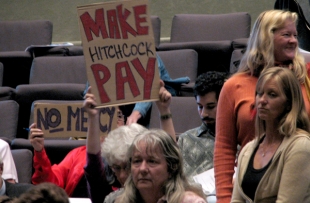 Everyone stipulates that Sean Hitchcock and his 2H Construction broke the law when between March 19th and 21st the company razed roughly 9 acres of land near Loynes Dr. and Studebaker Rd. Everyone. It’s not that Hitchcock didn’t own the land, it’s that he didn’t have a permit for the work 2H did. Legally speaking, you can’t just do as you will with your land. There are, for starters, environmental concerns—a consideration central to the goings-on here, from whether this land was wetlands (and thereby especially protected) to making sure that any work undertaken by 2H did not present environmental hazards (it did: methane from a landfill on the site was released into the atmosphere).
Everyone stipulates that Sean Hitchcock and his 2H Construction broke the law when between March 19th and 21st the company razed roughly 9 acres of land near Loynes Dr. and Studebaker Rd. Everyone. It’s not that Hitchcock didn’t own the land, it’s that he didn’t have a permit for the work 2H did. Legally speaking, you can’t just do as you will with your land. There are, for starters, environmental concerns—a consideration central to the goings-on here, from whether this land was wetlands (and thereby especially protected) to making sure that any work undertaken by 2H did not present environmental hazards (it did: methane from a landfill on the site was released into the atmosphere).
But I would like to confine my consideration of this matter to a simple legal question: the most pragmatic way to handle this instance of lawbreaking, especially in light of the sort of a community that we as a City would like to be.
Since I’m big on intents, a fair initial question is whether Hitchcock had mens rea (basically, knowledge of wrongdoing), or if his wrongdoing stemmed out of ignorance. You’ve probably heard it said that ignorance of the law is no defense against breaking it, but we might reasonably find sympathy with an individual who genuinely felt she were doing nothing wrong, morally nor legally, and who would not have committed her act of lawbreaking if she had been aware of its harmful or illegal status. But this is clearly not the case with Mr. Hitchcock. 2H Construction has a fairly extensive history of doing work within the City, and so something Hitchcock cannot credibly claim is that he simply did not know about Long Beach’s permitting requirements (1). So it appears that in Mr. Hitchcock we have a willful lawbreaker, a clear case of mens rea.
As I see it, a punitive law has two intended functions: to deter behavior we find so egregious that we feel the need to regulate against it, and to penalize those engaging in such behavior (including financially, when appropriate). As someone with a libertarian streak, I feel we should have as few laws as possible—but that we should enforce those laws we feel the need to have, because a law that isn’t enforced is not only quite literally useless, but it makes a city (etc.) seem like an incompetent bureaucracy. So, if we think the laws Mr. Hitchcock broke are bad ones, then it’s okay not to penalize him (just as I think it would have been okay not to penalize Rosa Parks for not giving up her seat, because Jim Crow laws were needless and crappy), but we should get rid of those laws. Yet I am aware of no one who feels this is the case with the laws in question here. To my knowledge even Mr. Hitchcock himself has not made such an assertion (except, perhaps, one implicit in his actions: that he need not be subject to the law).
 It seems, rather, that the question is what can the City do. There are various questions of what fines the City can and should impose, as well as issues related to the restorative measures 2H should be forced to undertake. After attending the Oct. 12 Zoning Administration hearing and listening to the many dedicated and knowledgeable folks who got themselves to City Hall at 2 p.m. on a Monday to speak on these matters, I am far too humbled to attempt to do so here (2). But there is another clear course of action.
It seems, rather, that the question is what can the City do. There are various questions of what fines the City can and should impose, as well as issues related to the restorative measures 2H should be forced to undertake. After attending the Oct. 12 Zoning Administration hearing and listening to the many dedicated and knowledgeable folks who got themselves to City Hall at 2 p.m. on a Monday to speak on these matters, I am far too humbled to attempt to do so here (2). But there is another clear course of action.
A few months ago Councilmember Garcia authored and Councilmember Lowenthal co-sponsored a proposal for an Equal Benefits Ordinance. I thought it was a great idea, even writing a column (and a damn fine one, too) in this very space supporting it. The rest of the Council apparently agreed, because they passed it unanimously. It’s a great idea because it says, in no uncertain terms: There are certain kinds of companies with which we as a City don’t wish to do business—in that case, companies that openly practice bigotry in the distribution of benefits to its employees.
I would hope another kind of company with which we as a City don’t wish to do business is the kind that comes into our city and willfully disregards the laws that we think are good ones. But that’s just what 2H Construction did. So if there are no serious penalties for Mr. Hitchcock’s lawbreaking, that says in effect at least one of two things: A) We don’t think the law he broke is a good one, and so we don’t really care if someone breaks it; and/or B) We don’t mind doing business with companies that come into our city and break our good laws. I am fully aware, of course, that no member of City staff would claim to favor either A or B as a matter of policy; but if there is no significant penalty for Mr. Hitchcock’s actions, presently and/or concerning the City’s potential future business dealings with 2H Construction, that is exactly the message we are sending, and that is our de facto policy in this particular case.
Unless I am grossly mistaken, this is not what any of us want for Long Beach.
Footnotes
(1) And in fact I am not aware of his having claimed said ignorance. His representative at the Oct. 12 Zoning Administrator hearing certainly did not make such a claim on his behalf.
(2) I will, however, make one related comment. In explaining his rationale for approving 2H’s permit for already-placed dirt to cap the landfill that 2H had illegally uncovered when they razed the plot of land (technically, what the hearing was all about), the hearing officer, Derek Burnham of the Dept. of Development Services, stated that his unwillingness to attach to the permit conditions requiring that the land be restored to wetlands condition was based upon an after-the-fact analysis of the land that indicated there is no wetlands flora, etc., even while admitting that this posteriori analysis didn’t necessarily tell us that there was no such flora before 2H’s illegal activities. Listening to the speakers at the hearing—which included a bevy of both certified experts and longtime residents with homes proximate to the land in question—it seems clear that at the very least there may have been just such flora, that at the very least there is some doubt concerning the antecedent facts of the matter. It is hard for me to grasp why the City would give the benefit of that doubt to 2H’s side, since it is 2H that is in the wrong and is the cause of our being able to better determine the on-site facts.

